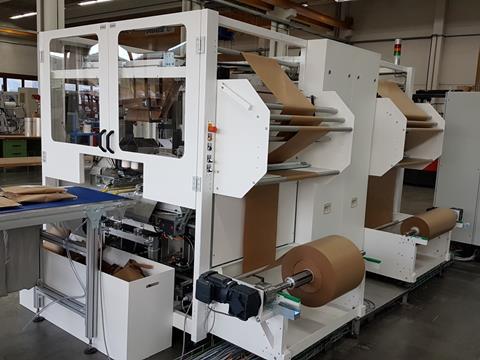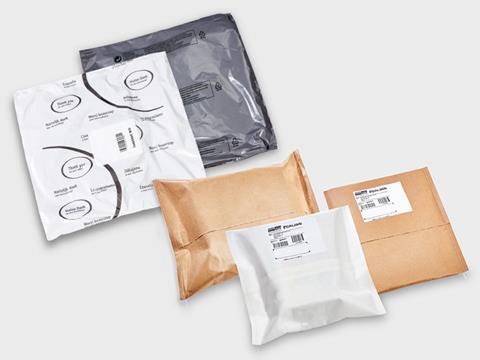
Timo Kollmann, managing director at Hugo Beck, discusses the critical role that packaging machinery plays in helping companies develop and scale solutions to meet emerging sustainability and circularity goals.
A shift in brand and consumer mindset

In the past, both brands and consumers have chosen packaging material based on four well-established factors: visual appearance, protective qualities, manufacturing costs, and ease of production. In more recent years, however, with consumers becoming more aware of the environmental impact of packaging – coupled with new regulations and legislations – a fifth factor has moved to the forefront: sustainability.
The rising importance of sustainability – particularly regulatory pressure and public concerns around single-use plastic packaging waste – is combining with other powerful trends to drive major changes in consumer packaging. Regulators and fast-moving consumer goods (FMCG) companies are proactively making bold commitments, both to improve the sustainability of packaging and to fundamentally rethink packaging systems.
In light of this change in mindset, many companies have been re-assessing their product packaging processes by looking for ways to minimise material consumption, invest in energy saving technology, adapt pack sizes, and seek out renewable source materials. Specialist machinery suppliers are playing a major role in meeting these demands.
Flexibility: A question of the right material choice
Whilst the topics of sustainability, recyclability and the circular economy of packaging are not new, urgency and awareness in the industry has increased significantly. With the use of plastics in general under heavy scrutiny from the media, many manufacturers are seeking alternative packaging solutions.
It is important to note, however, that every company’s long-term goal should include the pursuit of a genuinely holistic sustainability strategy. Making the move away from recyclable film packaging in favour of paper packaging – or even doing away with packaging all together – should be undertaken only when the sustainability benefit has been well thought out.
Thus, it is crucial to partner with a packaging machinery provider that helps to decide on the best material according to a company’s individual sustainability goals and product requirements. Machines that can handle recyclable plastic films made from mono-materials or recycled content, through to paper-based packaging, are becoming increasingly important in the eyes of brands.
Hybrid machines are the ideal solution for enabling the cost-effective, flexible use of paper alongside film packaging. Overall, such solutions deliver optimal functionality to customers and help future-proof their investment.
Suitable for heat and cold-sealable paper-based packaging materials, hybrid machines such as Hugo Beck’s fully automatic horizontal flowpack X machines provide optimum processing of diverse coated papers, including kraft, offset, and parchment, as well as other papers with PE, PLA, or dispersion coatings. They can also handle a range of film types with various thicknesses.
In addition, thanks to continuous transversal sealing, hybrid machines can offer a long dwell time and high sealing pressure even when working with complex coated papers. With such machines in high demand, this demonstrates that standard solutions are often not enough for the fast-paced industrial sector as it becomes more and more sustainability-inclined.
Processing speed, automation and tracking options must also be considered when assessing the suitability of a packaging system. Developing a tailored approach is often the best option.
Processing all types of machine compatible materials at high speeds
Alongside paper, film bags also continue to play a crucial role in packaging across many sectors. Plastic packaging is quickly shifting towards a higher percentage of recycled materials. With new paper types and films coming into the market, it is essential that machinery suppliers stay ahead and offer solutions that can process a diverse range of material types without difficulty.
One solution is continuous form fill and seal (FFS) machines, which are designed so that they use as little packaging material as possible. Configured individually and able to process all film types independent of the manufacturer, Hugo Beck’s servo X FFS machines have quickly become popular with customers across a variety of industries, offering a 15% reduction in material consumption through extremely tight packaging technology.
For ultimate resource efficiency, the use of thinner, lighter packaging and shrink films, such as those available from 7 μm thickness, enables significant material savings of around 60% per package compared to conventional films. These new films require machines that are designed for their specific use – otherwise the packaging quality and speed can suffer.
Additionally, the gap between products can be minimised by continuous FFS machines through the highly accurate synchronisation of the transverse sealing unit with each product. This can help to deliver the extremely close-fitted, precise, and film-efficient packaging with an excellent finish sought after by companies.
It is also worth noting that these continuous FFS machines offer high-volume production output with hardly any waste during the packaging process. In the case of shrink packaging, less film is then shrunk, which further improves the packaging result and reduces energy consumption.

Minimising material consumption through a tailored approach
Minimising the use of resources and waste is a key obligation across all sectors, but for the packaging industry, it is imperative. According to a report from Eurostat, as of 2019, packaging waste generated was estimated at 178.1 kg per inhabitant in the EU.
One solution to this problem is through precise, tailored packaging. Smart machines which can automatically adapt to the dimensions of each product, help to save a significant amount of material in both film and paper.
Machines like the servo X e-com fit – designed specifically due to a boom in demand for customised film bags in e-commerce packaging – aim to pack products with the lowest amount of film needed. This allows manufacturers to deal with the direct dispatch of individual goods, package groups of products, or meet the complex requirements of returned goods packaging.
Ticking boxes with automated packaging machinery
As manufacturers continue to choose to introduce more sustainably packaged products, their choice of machine needs to be sufficient.
Flexibility is no longer a luxury but a necessity in the packaging industry, and so machines need to be able to process a variety of materials, reduce wastage and energy, all whilst maintaining high functionality and efficiency. Choosing automated machine equipment which can be easily modified allows manufacturers to switch between packaging options more freely, while continuing to meet ever-changing industry regulations and consumer trends.














No comments yet